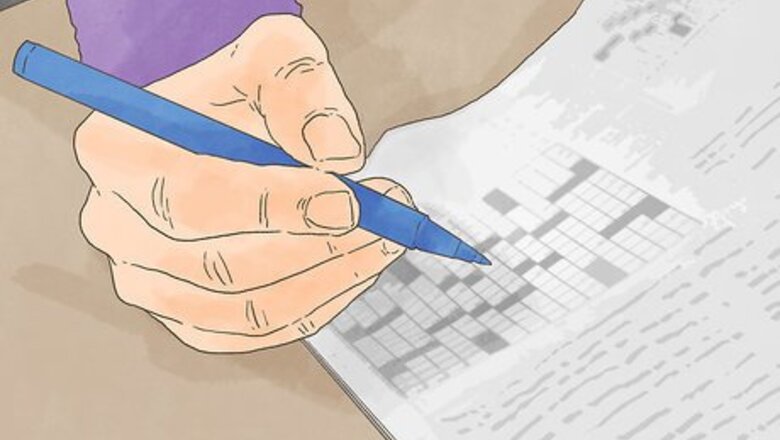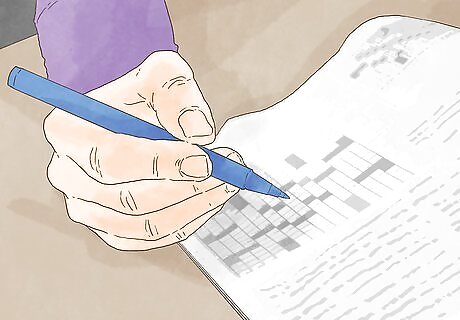
views
Helping Your Brain Stay Sharp

Keep your brain sharp. The connections in your brain that create short-term memory can be strengthened if you keep mentally active. Things like doing crossword puzzles, playing a musical instrument, or even learning new routes between home and work can help with brain activity. Try a crossword once or day, either in the morning or in the evening. If you don't already know a musical instrument, consider taking lessons. If you already play (or sing) set aside a half hour or so a day to practice.

Socialize more often. Depression and stress can both contribute to short-term memory loss. By spending more time with your friends or family, you can ward off stress and depression, and therefore improve your short-term memory. Something as simple as a regular phone call, or meeting for lunch for can help with short-term memory loss.

Get focused. If you find that you have a hard time remembering what you read, or what you’ve studied, try to limit the number of distractions around you. Pick a quiet space to work in. Turn your phone’s notifications off, or turn your phone on silent. The less distracted you are as you work, the more likely you are to improve your short-term memory.

Chew gum while you learn. Scientists aren’t sure why, but chewing gum while learning can increase activity in the area of the brain responsible for memory. While you’re studying or working on an important project, chew a piece of gum. It could improve your ability to retain what you’ve learned! Make sure that you chew the same flavor of gum each time you study. When taking the exam, ask your teacher if you can chew gum. Use the same flavor.

Doodle while you listen. If you’re worried about your ability to retain what someone says to you, try doodling while they talk! Doodling can actually help you focus on just two things – what you’re drawing and what someone else is saying. Just make sure you warn the person you’re speaking to that you’ll be doodling. For example, you can say something like “I find that doodling while I speak to someone helps me remember what we said later. Do you mind if I doodle while we chat?” You can doodle in meetings, too, just make sure you’re being polite.
Taking Care of Your Body

Get enough sleep. Our brains create new connections – some of them related to memory – while we sleep. Getting enough sleep can therefore help you overcome some short-term memory loss. You should get at least 8 hours every night, and you should try to go to sleep and get up at the same time every day. Make sure you avoid any sort of stimulants - like caffeine - 30 minutes before bedtime. These can keep you awake. Don't eat fatty, spicy, or heavy food before you sleep. They can cause heartburn, which can either keep you awake or wake you up. Avoid those types of food 2 to 3 hours before bed. Avoid using electronics in bed. The light that comes from the screens of phones, tablets, and laptops can make your brain think it's daytime, which can keep you awake.

Stay active. Being physically active contributes your body’s overall health. And if you’re generally healthy, your memory can improve. You should get 30 minutes of activity each day, whether that’s walking, going for a run, or taking an exercise class. If you can't get up and exercise for whatever reason, consider stationary exercises.

Eat a healthy diet. Fruits, vegetables, and whole grains are as good for your brain as they are for your body. Add some low-fat protein, like chicken, and plenty of water to your diet, too. You might find that the cleaner you eat, the clearer your memory is. For breakfast, try a bowl of mixed fruit and a hard-boiled egg or two. You can also have coffee or tea, but don't put too much creamer in either. A sandwich with lots of veggies and lean protein like sliced chicken or turkey, on whole wheat bread, is a great lunch idea. So is a salad. For dinner, try grilled or baked chicken or fish, and a heaping side of vegetables.

Manage health conditions. There are plenty of health conditions that can affect your short-term memory, including depression, high blood pressure, and thyroid problems. Make sure you take the medication you’re supposed to, since untreated health conditions can contribute to short-term memory loss. If you are taking your medicine regularly and you start to notice changes in your short-term memory, talk to your doctor. Some medications can interfere with your memory, and how you react to them might change over time.

Meditate. Learning how to meditate means learning how to ignore everyday distractions. People who mediate often find that even when they’re not meditating, they’re able to focus better. Give yourself 10 minutes a day to sit in a quiet room and meditate. You can learn to meditate in a lot of different ways. There are smartphone apps that lead you through meditations. There are also lots of YouTube videos that do the same.

Talk to your doctor if you’re worried. If you find that your short-term memory loss interferes with your ability to live your daily life, see your doctor. Short-term memory loss can indicate other serious health issues, and your doctor can help identify and treat them.
Managing Memory Loss

Write everything down. If you have a hard time remembering appointments or your to-do list, write them down! Use one thing to track everything go on in your life, whether it’s a calendar app, a paper planner, or just a plain notebook. Refer to it often and check things off as you complete them. If this is a digital notebook or app, having a backup copy somewhere would be a very good idea.

Make sure everything has its own place. If you find you can’t remember where you left objects you need every day, assign a place for them. When you first assign everything its place, write them down. That way you’ll have a list you can refer to until you get accustomed to where everything is. For example, you could: Install a hook by the door for your keys. Always leave your cell phone and wallet on your desk. Keep your checkbook in a drawer in the kitchen.

Stick to a routine. Everyone has things they need to do every day. Turn yours into a routine, where you do your daily tasks in the same order, at the same time, every single day. Eventually, the routine will become second nature and you won’t have to worry about forgetting to do something. While you’re getting used to your routine, schedule it in a planner or notebook every day. Note what time you’ll get up, make coffee, brush your teeth, make dinner, clean dishes, and get ready for bed.

Ask people to repeat themselves. Short-term memory loss might make you feel embarrassed, but most people won’t mind repeating themselves if you ask. This way, you know that you won’t have to remember things, and some of the pressure will be taken off of you. You can say something like, “please forgive me if I’ve already asked you this. But would you mind reminding me where the room is for the conference?”

Use mnemonics. This is a great tool for everybody to master, not just for people who suffer from short-term memory loss. Mnemonics is the technique of attaching a word, phrase, or image to an object. This skill can be very powerful, and the memorization will stick in your brain like super glue. Perhaps you've never heard of mnemonics, but ask yourself: "Self, how many days are in September?" Chances are, the first thing that popped into your mind was "30 days hath September." If you meet a woman named Zoe, rhyme a feature on her face with her name. It doesn't even have to make sense. "Zoe, eyes aglow-y," for example. Make yourself laugh with your mnemonic. Make your memory aid a rude limerick, as in "The new boss's name is Vig Ronson, who's rumored to have a...," etc. (Fill in the blanks—–it's good for your memory!)

Try "chunking" information. If you need to memorize something important and you're finding it difficult to do so, separate the information into smaller groups. Try this technique with grocery lists, birthdays, names or other things you want to remember. The most common example of chunking is phone numbers––instead of trying to remember one 10-digit number, most people find it easier to remember two 3-digit numbers and one 4-digit number, like 123-456-7890.



















Comments
0 comment